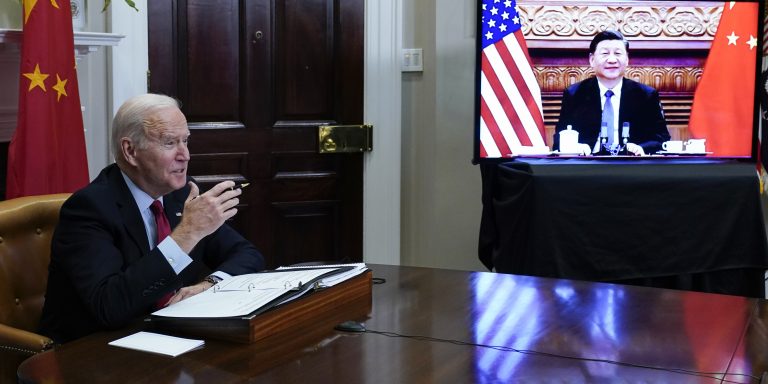INTELBRIEF
November 18, 2021
IntelBrief: Biden-Xi Virtual Summit Seeks to Prevent Further Deterioration of U.S.-China Relations

Bottom Line Up Front
- U.S. President Joe Biden and China’s leader, Xi Jinping, met earlier this week for a virtual summit, designed as a platform to steady the relationship between two global powers.
- Perhaps the most contentious issue in the relationship is the status of Taiwan, with President Xi warning the United States that it was “playing with fire.”
- Even as the U.S. and China will continue to compete aggressively in nearly every sector, there are explicit areas where cooperation will be a pre-requisite to tackling some of the most pressing global challenges.
- The Biden administration has pledged to conduct a foreign policy undergirded by respect for and protection of human rights, and has criticized China for its handling of Tibet, Hong Kong, and Xinjiang.
U.S. President Joe Biden and China’s leader, Xi Jinping, met earlier this week for three and a half hours as part of a virtual summit, designed as a platform to steady the relationship between two global powers. U.S.-China relations are at somewhat of a nadir, following finger pointing and aspersions cast over issues including the origins of COVID-19, human rights, the status of Taiwan, and a range of economic and trade disagreements. A White House readout from the meeting suggests little progress on substance and more of an attempt to erect “guardrails” in order to fend off further escalation. President Xi used a maritime reference, likening the relationship to two ships that must navigate rough seas while avoiding a collision. The U.S. relationship with Xi, in particular, is paramount. At 68 years old, Xi will remain the most dominant figure in the Chinese Communist Party (CCP) for the foreseeable future. He was recently elevated to near-mythical status in a CCP meeting that followed his summit with Biden. The CCP issued a resolution on history marking Xi as one of its revered leaders, alongside Mao Zedong and Deng Xiaoping.
Perhaps the most contentious issue in the relationship is the status of Taiwan. Beijing’s aggressive military posture vis-à-vis Taipei has been a flashpoint between the U.S. and China. President Biden’s comments about a U.S. “commitment” to defend Taiwan are at odds with the longstanding U.S. policy of strategic ambiguity, and were even walked back. Australia recently voiced support for assisting the U.S. in any future defense of Taiwan, an issue President Xi warned is like “playing with fire.” Xi has also made thinly veiled critiques of U.S. efforts to engage with new security arrangements such as “the Quad,” which consists of the U.S., Australia, India, and Japan. China, perhaps correctly, sees initiatives like “the Quad” as a deliberate attempt to contain Beijing’s growing power in the Indo-Pacific. The issue of Taiwan has come up more frequently following the U.S. withdrawal from Afghanistan, with some wondering aloud whether Washington has enough “skin in the game” when it comes to protecting its longstanding allies. Similar questions were raised in October 2019 when the U.S. withdrew troops from Syria and left Kurdish allies vulnerable to a Turkish military incursion.
The fact remains, even as the U.S. and China will continue to compete aggressively in nearly every sector, there are explicit areas—health security and climate change—where cooperation will be a pre-requisite to tackling some of the most pressing global challenges. But overall, there are more areas of divergence than convergence, and the two countries now view nearly every move the other makes through a zero-sum lens, assessing how it impacts the global balance of power. Concerns are growing in the Pentagon about China’s expanding strategic nuclear arsenal, which, when coupled with so-called “wolf warrior diplomacy,” paints the picture of a far more assertive China. Beijing’s actions in cyberspace have also drawn the ire of Washington and its allies, including cyberespionage and accusations of other malicious activities. Trade, technology, and economics will continue to be crucial issues that will be characterized by both competition and at times necessary cooperation.
The Biden administration has pledged to conduct a foreign policy undergirded by respect for and protection of human rights, and has criticized China for its handling of Tibet, Hong Kong, and Xinjiang. The Washington Post reports that the Administration is preparing to announce a diplomatic boycott of the 2022 Winter Olympics in Beijing, as a sign of protest. Beijing treats these issues as strictly internal matters, considering external interference in Chinese affairs a violation of national sovereignty. China uses this framing to avoid criticism and obfuscate the truth, while simultaneously relying on coercion, diplomacy, economic incentives, and other tools to silence dissent and goad states into acquiescence. To many, how this relationship develops or degrades is the most important foreign policy storyline of the immediate future—the U.S.-China relationship epitomizes great power rivalry. The virtual summit aimed to deescalate tensions amidst intensifying competition and allow each side to air its grievances to better understand the other side’s main concerns.